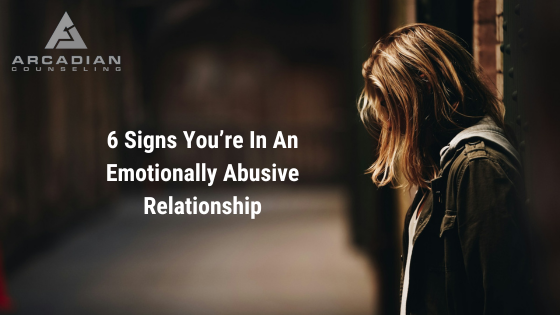Emotional abuse in relationships can easily and often go unnoticed, as its scars are internal and not always visible. Unlike physical abuse, emotional abuse is characterized by subtle yet damaging behaviors that chip away at a person’s self-worth and mental well-being. Recognizing the signs you’re in an emotionally abusive relationship is crucial for breaking free from its toxic grip as well as preventing yourself from returning to one.
There are numerous signs and they can look different from relationship to relationship. Here are 6 of the most common and insidious signs you’re in an emotionally abusive relationship:
Signs you’re in an emotionally abusive relationship

1. Constant Criticism and Belittling
In a healthy relationship, constructive feedback is a tool for growth and improvement. However, in an emotionally abusive relationship, criticism takes on a different form. Constantly belittling remarks, harsh judgments, and demeaning comments become the norm. This destructive behavior erodes your self-esteem, leaving you feeling unworthy and powerless. If your partner habitually criticizes your appearance, intelligence, or abilities, it’s a red flag for emotional abuse.

2. Isolation and Control
Emotionally abusive individuals often seek to control every aspect of their partner’s life, including social interactions. They may attempt to isolate you from friends and family, creating an environment where they have complete dominance. This isolation not only limits your support system but also makes you increasingly dependent on the abuser. If your partner consistently undermines your connections with others or demands to know your every move, it’s a sign of control that can escalate over time.
3. Manipulation and Gaslighting
Gaslighting is a manipulative tactic used by emotional abusers to make their victims question their own reality. They may deny events that occurred, distort facts, or undermine your perception of the truth. This constant manipulation leaves you feeling confused, doubting your own memory, and even questioning your sanity. If your partner frequently dismisses your feelings or makes you second-guess your experiences, it’s a clear indication of emotional abuse.
4. Emotional Withholding

In a healthy relationship, emotional support is a cornerstone. However, emotional abusers often withhold affection, validation, and empathy as a means of control. They may give you the silent treatment, withdraw affection, or dismiss your emotions altogether. This emotional withholding leaves you feeling lonely, rejected, and desperate for validation. If your partner consistently denies you emotional support, it’s a sign of emotional abuse.
5. Explosive Anger and Intimidation
Emotionally abusive individuals may resort to explosive anger and intimidation to maintain control. They use fear as a tool to silence you and prevent you from asserting yourself. This can manifest as shouting, throwing objects, or other intimidating behaviors. If your partner’s anger is unpredictable and leaves you walking on eggshells, it’s a clear sign of emotional abuse. No one should live in fear within the confines of a relationship.
4. Blame-Shifting and Deflection
Emotional abusers often refuse to take responsibility for their actions. Instead, they shift blame onto their partner, deflecting accountability for their behaviors. This tactic leaves you feeling guilty for things that are not your fault and perpetuates a cycle of self-blame. If your partner consistently avoids accountability, deflects blame onto you, or minimizes their actions, it’s a warning sign of emotional abuse.
Life is short but if you’re trapped in an emotionally abusive relationship it’s going to feel more that just short; it’s going to feel awful. If you’re struggling in your relationships and need help, find an awesome therapist you like and trust you help you navigate your way into a more healthy and fulfilling relationship.
Recognizing the signs of emotional abuse is the first step toward breaking free from its harmful effects. If any of this feels uncomfortably familiar, consider seeking support from friends, family, or a professional counselor. Remember, a healthy relationship is built on mutual respect, communication, and support and if any of these elements are missing from your relationship, it’s time to have a long look in the mirror and ask yourself what you’re doing.
James Killian, LPC is the Principal Therapist & Owner of Arcadian Counseling in Greater New Haven, CT where they specialize in helping over-thinkers, high achievers, and perfectionists reduce stress, increase fulfillment and enhance performance so they can move From Surviving To Thriving.

